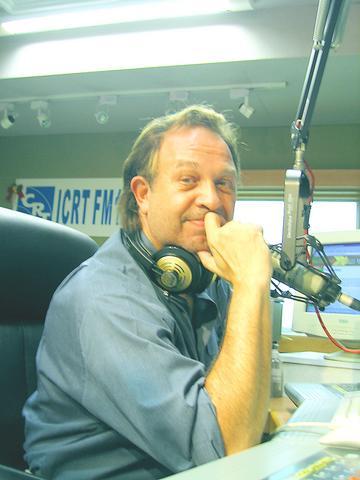Rising out of the ashes of Armed Forces Network Taiwan (AFNRT), International Community Radio Taipei's (ICRT) was born at one minute past midnight on April 16, 1979. Using equipment purchased from the US military for the nominal sum of US$1, the station's inaugural broadcast was hosted by a DJ who didn't bother to introduce himself and featured cover tunes by unknown artists.
The anonymity with which the station came into being was to be short lived. Within five years the station had gained nationwide appeal due to its professional programming and built up audience figures averaging 10,000 listeners per day.

PHOTO: GAVIN PHIPPS, TAIPEI TIMES
"There were only three television stations and the other radio stations played a limited amount of boring, conservative music. We were different and people used ICRT as a way to leave the island and emigrate," said Morning Call host, Rick Monday. "We had a lot of talented people and real radio professionals working for us who knew what audiences wanted."

PHOTO: GAVIN PHIPPS, TAIPEI TIMES
As well as having a feel for their audiences, many of ICRT's early DJs become larger-than-life celebrity figures in Taiwan. Radio personalities such as Patrick Steele and Tony Taylor were regularly featured in magazine articles, appeared on television game shows and were recognized and swamped by fans wherever they went.
"At that time, ICRT was huge with everyone on the island. It was a fun period with so much notoriety. It was certainly a time of great popularity for the station," said ICRT's News Director Todd van Wykes. "DJs like Samantha K were treated like pop stars."
It was not all fun and games at ICRT and the station did have its more serious side, in the form of its news department. Nicholas Gould's cutting-edge Issues and Opinions broke new ground when it was first broadcast in the late-'80s and was lauded both locally and internationally for its unrivaled and non-politically partisan coverage of local news events.
Controversy was never far behind, however, and came to a head on April 17, 1991. After the station aired reports from a protest organized by the then-opposition Democratic Progressive Party (DPP) the station's board of directors canned the show, demoted Gould and fired the program's reporters on the ground's that ICRT was becoming too pro-DPP.
"We were always accused of being run by a board of a pro-KMT business leaders, but [Gould] went out and proved that ICRT had a balanced voice," said Monday. "You have to hand it to him for what he did. He made us stand out."
The station's decade-and-a-half of unrivalled prosperity came to an abrupt end in the mid-1990s following the government's revised of the Broadcast and Television Law (
"There were suddenly a lot more players in the field and more radio stations were fighting for a piece of the pie. It was a gradual thing for us, as we were a strong brand and long-term sponsors knew this," said van Wykes. "But with new [stations] about, the big-name ad agencies had more options."
Ironically it was to be the reason behind ICRT's popularity that was to prove its undoing. Many of Taiwan's early music-radio stations set about claiming the airwaves and poaching listeners by aping ICRT's tried, tested and hugely popular format.
"ICRT laid out a lot of the formats from which a lot of those radio station's worked. ICRT was radio 101 for those guys," said icon and veteran DJ Richie Walker. "They learned format, content delivery and even about jingles. ICRT and its flowing Western style led the field and was their teacher."
In order to compete with the new stations, ICRT began to toy with its programming formats. The first major shake-up saw its predominantly English-language music content ditched in favor of more Chinese-language tunes and more Mandarin DJ chatter. The format was dropped shortly thereafter due to rising criticism from the expat community the station was initially meant to serve.
"ICRT has to carry the burden of being something for everybody. The basic axiom for our existence was to serve the foreign community, but we also had large numbers of local listeners," said Walker. "We're expected to be so many things for so many people and because of this we ended up in a Catch-22 situation and were getting hit from all sides."
In the wake of the fallout from the disastrous revamp, the station tried to regain its once loyal expat audiences by returning to a format of less talk and more music. Once again the ever-fickle listening public didn't like what it heard. The drop in popularity became evident after the station dropped to as low as seventh in an AC Nielson poll. While not accurately reflective of genuine audience figures, as it did not include foreign listeners, it was still a blow to a station that had been in the top five since its inception.
The less radical program reformat in April of last year has, for the time being at any rate, paid dividends and the station is once again back in the top flight. UFO, KISS and WAVE Radio may still claim the top slots, but ICRT is now in fourth place in the most recent AC Nielsen poll. And if recently appointed General Manager Janet Chu (
"We need to understand where the radio station is going, forget about the past and find a niche. The market and audience has changed and this should be reflected in the format and the music we play," said Chu. "American culture is not dominant anymore and the audience now includes Filipinos, Koreans, Japanese and Europeans. We need to redefine what international means."
According to Monday, one way in which the station can continue to grow and attract new listeners is to become a more "active" radio station by taking an increased interest in the community and act as if it is part if it.
"We can build a base by holding regular contests and helping the community. Our recent drive to create better English television by petitioning the GIO was the highlight of the past 20 years. We received 31,356 e-mails," he said. "We need to always be fresh and new, as radio station should be at the forefront of trends."
Chu remains tight-lipped about her long-term plans for ICRT, but a more active and listener/community friendly station is high on the agenda. More immediate tasks include increasing the station's song library from 3,000 to 9,000 titles, changing the policy of DJ chatter and ensuring that more information is made avaialble to the community.
While it is still too early to put a time frame on when things will once again change at ICRT, Chu's final goal remains one that she hopes will establish ICRT as a culture unto itself, rather than simply yet another radio station.
"We want to surprise the audience," she said. "And make them feel more exited about the radio station."

The 1990s were a turbulent time for the Chinese Nationalist Party’s (KMT) patronage factions. For a look at how they formed, check out the March 2 “Deep Dives.” In the boom years of the 1980s and 1990s the factions amassed fortunes from corruption, access to the levers of local government and prime access to property. They also moved into industries like construction and the gravel business, devastating river ecosystems while the governments they controlled looked the other way. By this period, the factions had largely carved out geographical feifdoms in the local jurisdictions the national KMT restrained them to. For example,

The remains of this Japanese-era trail designed to protect the camphor industry make for a scenic day-hike, a fascinating overnight hike or a challenging multi-day adventure Maolin District (茂林) in Kaohsiung is well known for beautiful roadside scenery, waterfalls, the annual butterfly migration and indigenous culture. A lesser known but worthwhile destination here lies along the very top of the valley: the Liugui Security Path (六龜警備道). This relic of the Japanese era once isolated the Maolin valley from the outside world but now serves to draw tourists in. The path originally ran for about 50km, but not all of this trail is still easily walkable. The nicest section for a simple day hike is the heavily trafficked southern section above Maolin and Wanshan (萬山) villages. Remains of

With over 100 works on display, this is Louise Bourgeois’ first solo show in Taiwan. Visitors are invited to traverse her world of love and hate, vengeance and acceptance, trauma and reconciliation. Dominating the entrance, the nine-foot-tall Crouching Spider (2003) greets visitors. The creature looms behind the glass facade, symbolic protector and gatekeeper to the intimate journey ahead. Bourgeois, best known for her giant spider sculptures, is one of the most influential artist of the twentieth century. Blending vulnerability and defiance through themes of sexuality, trauma and identity, her work reshaped the landscape of contemporary art with fearless honesty. “People are influenced by

April 14 to April 20 In March 1947, Sising Katadrepan urged the government to drop the “high mountain people” (高山族) designation for Indigenous Taiwanese and refer to them as “Taiwan people” (台灣族). He considered the term derogatory, arguing that it made them sound like animals. The Taiwan Provincial Government agreed to stop using the term, stating that Indigenous Taiwanese suffered all sorts of discrimination and oppression under the Japanese and were forced to live in the mountains as outsiders to society. Now, under the new regime, they would be seen as equals, thus they should be henceforth